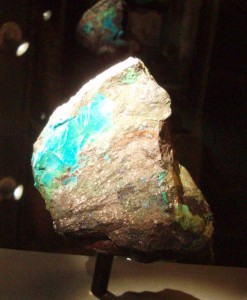Sunny 55 in Bisbee/Sunny 65 in Tucson
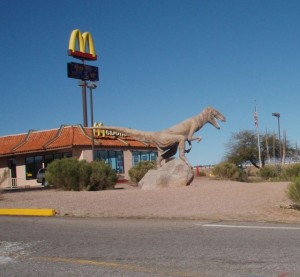
Would a McDonalds like this appear in other than Benson, Arizona?
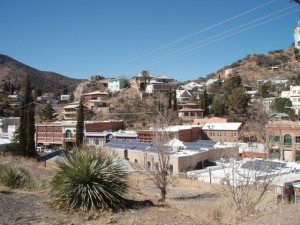
View of "quirky" Bisbee.
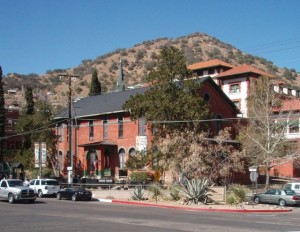
The Bisbee Mining & Historical Museum is in the old Copper Queen Mine Headquarters building. The historic Copper Queen Hotel is in the background.
A little day trip was in store for us today. Since it is rock related we will share with you our adventures.
Bisbee, Arizona is considered one of the quirkiest towns in America. I have been there before a few years ago. At that time I was in Tucson by myself while Bonnie taught school. This is a true story: I arrived in Bisbee and got out of my car near a coffee shop downtown. What appeared to be an “Old Hippy’ came up to me and said “You wanna rumble?”. I replied that I had not even had my coffee yet and he just said “OK”, and walked away. That was my introduction to Bisbee.
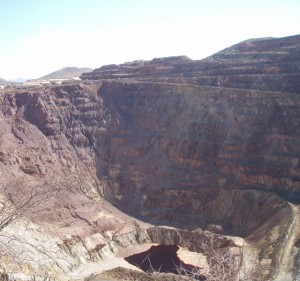
The 900 foot deep Lavender Pit.
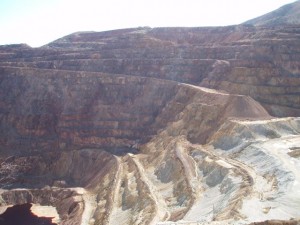
Another view of the Lavender Pit.
In early 1950s, after years of underground copper mining at the Copper Queen Mine and other mines in the area, open pit mining began near the Copper Queen Mine at the “Lavender Pit”, which was a mountain at that time. The Lavender Pit was named after Harrison Lavender, VP and General Manager of Phelps Dodge Cooperation, the owners of the mine. After mining 600,000 tons of copper from 86 million tons of waste, the Lavender Pit closed in 1974. The closure nearly killed Bisbee as most of the residents mined or had service businesses supported by the miners.
Things got so bad that even the largest hotel in town, the Copper Queen, was offered for sale for $1 to any local resident that would take it. There were no takers, so the hotel was sold to outside interests. The town was discovered by hippies after the mines were closed. Many moved there for the cheap houses for sale. I noticed many of the hippies are still there, but with canes and walkers.
I did not take the tour of the Copper Queen Mine, as I have before. I pretty much think if you’ve see one underground copper mine, you’ve seen them all. Unlike the mines in Michigan, native copper was not mined or appreciated, and the miners hated hitting veins of native copper. Their machinery was not equipped to process big chunks of pure copper.
The town is very historic. Many of the houses are right on the sides of the steep slopes with their fronts of backs held up by posts. This makes the town sort of different, with no rhyme or reason for the layout.
The history of the mining operations sort of parallels that of the mines in the Keweenaw. Cornish, Finish, and Serbian miners, among others, were lured with offers of housing and fair pay. They even know what a Pasty is in Bisbee.
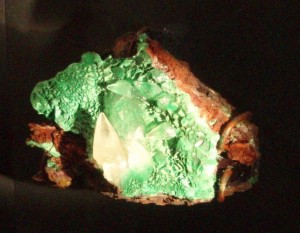
Calcite and Malachite on Goethite-Copper Queen Mine-Bisbee Museum
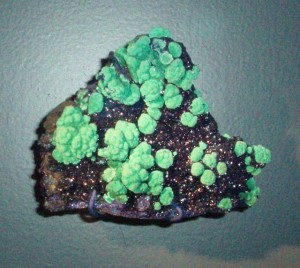
Malachite/Azurite-Czar Mne-Bisbee Museum
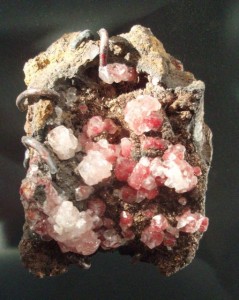
Calcite tinted by Cuprite with Copper-Czar Mine-Bisbee Museum
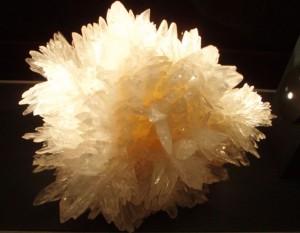
Calcite Crystal Specimen-Museum
Wonderful Malachite, Azurite, Calcite, and other minerals were found in the Copper Queen Mine as well as later at the Lavender Pit. Some of Arizona’s most historical and extraordinary mineral specimens came from the Bisbee area. You can real more about the Copper Queen and the Lavender pit on line.
Sometimes the Copper Queen miners would hit oxidation pockets or “Crystal Caves” with stalactites and stalagmites colored beautifully by copper, somewhat unusual for copper mines. Some of these caves were larger than football fields. The miners used these caves for breaks and scenic underground lunches.
The Lavender Pit as well as the Copper Queen also produced some of the finest Turquoise in the southwest, especially the famous “Bisbee Blue” from the Lavender Pit. Hunting in the pit is only allowed once a year, and only on the spoil piles where chances are slim that any old Bisbee Blue will be found.
Some of the wonderful mineral specimens can be seen at the Bisbee Mining & Historical Museum, associated with the Smithsonium.
No one wanted to “rumble” today and we had a wonderful walking tour of many of the gift shops. Also we bought some Killer Bee Honey from a guy that travels all over ridding house, properties, and businesses of killer bees. As a reward, he gets to keep the honey. YUM!








